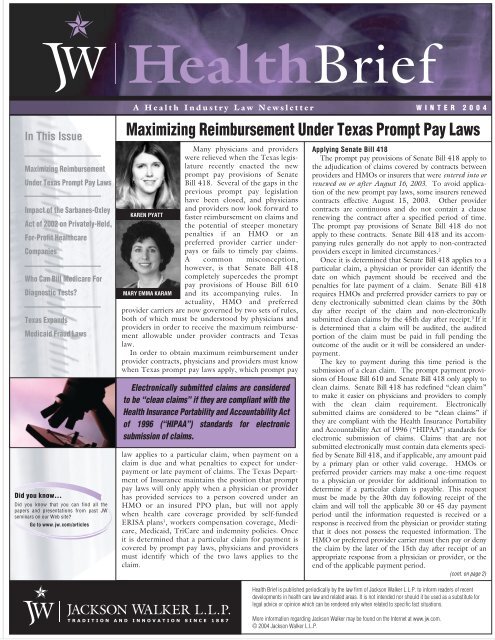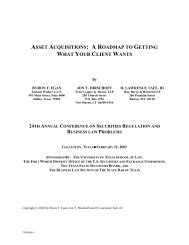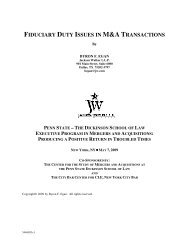Maximizing Reimbursement Under Texas Prompt Pay Laws (cont
Maximizing Reimbursement Under Texas Prompt Pay Laws (cont
Maximizing Reimbursement Under Texas Prompt Pay Laws (cont
You also want an ePaper? Increase the reach of your titles
YUMPU automatically turns print PDFs into web optimized ePapers that Google loves.
<strong>Maximizing</strong> <strong>Reimbursement</strong> <strong>Under</strong> <strong>Texas</strong> <strong>Prompt</strong> <strong>Pay</strong> <strong>Laws</strong> (<strong>cont</strong>.)Senate Bill 418 provides a graduated penalty for claims that are not timely paid.Physicians and providers are entitled to the following penalties for late payment ofclaims in addition to the <strong>cont</strong>racted rates:• If a claim is paid between the 1st and 45th day following the applicablepayment period, the physician or provider is entitled to receive a penaltyequal to the lesser of 50% of the difference between the <strong>cont</strong>racted rate andbilled charges, or $100,000. 4• If a claim is paid between the 46th and 90th day following the applicablepayment period, the physician or provider is entitled to receive a penaltyequal to the lesser of 100% of the difference between the <strong>cont</strong>racted rate andbilled charges, or $200,000.• If the claim is paid on or after the 91st day following the applicable paymentperiod, the physician or provider is entitled to receive a penalty equal to 100%of the difference between the <strong>cont</strong>racted rate and billed charges plus 18%annual interest on the penalty amount.If an HMO or preferred provider carrier underpays a claim, the followingpenalties apply:• If the balance of a claim is paid between the 1st and 45th day following theapplicable payment period, the physician or provider is entitled to receive apenalty equal to the lesser of 50% of the underpaid amount, or $100,000.• If the balance of a claim is paid between the 46th and 90th day following theapplicable payment period, the physician or provider is entitled to receive apenalty equal to the lesser of 100% of the underpaid amount, or $200,000.• If the balance of a claim is paid on or after the 91st day following the applicablepayment period, the physician or provider is entitled to receive apenalty equal to 100% of the underpaid amount plus 18% annual interest onthe penalty amount.Applying House Bill 610Contracted providers that have “Evergreen” <strong>cont</strong>racts or <strong>cont</strong>racts that wereentered into or renewed prior to August 16, 2003, must look to House Bill 610for guidance on claims submission and payment. Like Senate Bill 418, the promptpay provisions of House Bill 610 apply only to the submission of clean claims.<strong>Under</strong> House Bill 610, however, the definition of “clean claim” is broader andallows HMOs and preferred provider carriers to make additional requirements inorder for a claim to be considered “clean.” A physician or provider submits a“clean claim” under House Bill 610 by providing the required data elements specifiedby the rule along with any attachments or additional elements requested by theHMO or preferred provider carrier of which the physician or provider has beenproperly notified. HMOs and preferred provider carriers have much more latitudeto make their own determinations as to what constitutes a clean claim under HouseBill 610 and many physicians and providers have been surprised to learn that theprompt pay provisions do not apply to many of their claims because the claims failto include all of the data elements required by the rule (CMS-1500 field 15, forexample) or they do not include the correct attachments or additional dataelements required by a particular insurer. Physicians and providers must make surethey are aware of the clean claim requirements for each of their <strong>cont</strong>racts withHMOs or preferred provider carriers in order to qualify for prompt payment ofclaims under House Bill 610.Once a clean claim has been submitted, House Bill 610 requires the claim to bepaid or denied within 45 days after the HMO or preferred provider carrier receivesthe claim. If a claim is audited, 85% of the <strong>cont</strong>racted rate of the audited portion ofthe claim must be paid within the statutory payment period. If a clean claim is notpaid or denied within the statutory time period, HMOs and preferred providercarriers are liable for 100% of the billed charges 5 or the <strong>cont</strong>racted penalty rate.Though most physicians and providers prefer the prompt pay provisions ofSenate Bill 418, reimbursement can be maximized under either law by understandingand complying with the nuances of each. Awareness of what is owed,when it should be paid and what penalties are available will help physicians andproviders collect every dollar owed under the prompt pay laws.If you have any further questions concerning <strong>Texas</strong> prompt pay laws, pleasefeel free to call Karen Pyatt at (214) 953-6125 or Mary Emma Karam at (214)953-6041.1.A recent case in the United States District Court in the Northern District of <strong>Texas</strong> held that ERISA did not preempt a prompt pay claimbrought against Blue Cross Blue Shield of Arkansas, the payor of a fully insured ERISA plan. See Baylor University Medical Center v.Arkansas Blue Cross Blue Shield, Civil Action No. 3:03-CV-2084-G (N.D. Tex. Jan. 9, 2004).2.The “Verification” and “Effect of Filing a Clean Claim” provisions of Senate Bill 418 apply to non-<strong>cont</strong>racted physicians providingservices on or after August 16, 2003: a) on referral from an HMO, PPO or preferred provider because the services were not reasonablyavailable in-network; or b) that are emergency care services.3.Senate Bill 418 and House Bill 610 have 21-day adjudication periods for pharmacy claims.4.“Billed Charges” under Senate Bill 418 are the charges for medical or health care services included on a claim submitted by aphysician or provider.5.“Billed charges” under House Bill 610 are “the charges made by a physician or provider who renders or furnishes services,treatments, or supplies provided the charge is not in excess of the general level of charges made by other physicians or providerswho render or furnish the same or similar services, treatments, or supplies to persons in the same geographical area and whoseillness or injury is comparable in nature or severity. In the event of a case rate agreed to between the physician or provider and theHMO or preferred provider carrier, billed charges shall be considered the higher of the case rate or billed charges.”Impact of the Sarbanes-Oxley Act of 2002 on Privately-Held, For-Profit Healthcare CompaniesJAMES S. RYAN, IIIThe impact on public companies of the Sarbanes-Oxley Act of 2002 (the “SOA”) has been widelypublicized. The provisions of the SOA have beenparticularly noted in the for-profit healthcarecommunity because, in connection with the criminalinvestigation ofHealthSouthCorporationand several ofits officers, the federal governmentfor the first time brought criminalcharges based on the financialstatement certification provisions ofSection 906 of the SOA. Mostprovisions of the SOA specificallyapply to publicly held corporations, although SOA criminal provisionsconcerning obstruction of justice through document destruction andretaliation apply directly to privately held and nonprofit concerns. Certainprovisions of the SOA that specifically apply to publicly held companies,particularly those related to public company financial statementcertifications and certifications regarding internal <strong>cont</strong>rols and procedures,should affect the conduct of many privately held for-profit healthcareconcerns, particularly those anticipating a liquidity event through a sale ofthe company or an initial public offering.Maintenance of effective complianceplans goes hand-in-hand with maintenanceof the types of internal <strong>cont</strong>rols andprocedures that will result in developmentof accurate financial statements.Background Information RegardingFinancial Statement CertificationsSection 302 CertificationSection 302 of SOA is a civil statutethat requires that the principalexecutive officer and principal financialofficer of each company required to fileperiodic reports with the Securities andExchange Commission (the“Commission”) provide a written certification with each quarterly andannual report filed with the Commission. Each Section 302 certificationmust state that:(1) the officer has reviewed the report;(<strong>cont</strong>. on page 3)2
<strong>Texas</strong> Expands Medicaid Fraud <strong>Laws</strong>The 78th <strong>Texas</strong> Legislature recently adoptedsignificant revisions to existing <strong>Texas</strong> MedicaidFraud statutes in House Bill 1743. Health careproviders who participate in the Medicaidprogram should be aware of the following newMedicaid Fraud provisions:CARLA COX Prepayment and Postpayment ReviewsAmendments to §32.0321 of the HumanResources Code provide for prepayment and postpayment reviews ofa claim for Medicaid reimbursement to determine whether the claiminvolves fraud or abuse. <strong>Pay</strong>ment may be withheld for 5 working daysfor prepayment review without notice. Postpayment holds may beplaced on payment of future claims if the Department of HumanServices has reliable evidence of fraud or willful misrepresentationregarding a Medicaid claim.The provider must be given notice of a postpayment hold not laterthan 5th working day after imposition of the hold. An expeditedadministrative hearing is available on timely written request byprovider. The hearing must berequested within 10 calendar daysof receipt of the notice of vendorhold. The Health and HumanServices Commission (“HHSC”) isto adopt rules to provide forinformal resolution ofpostpayment holds. The providerhas 10 days from date of notice toseek informal resolution. The request for informal resolution doesnot extend the deadline for requesting an expedited hearing.Therefore, an informal review and expedited hearing must berequested at the same time.The violation of a fraud or antikickbackstatute is a state jailfelony. The Attorney General is, forthe first time, given the authority toprosecute criminal violations withthe consent of local prosecutor.Surety BondsHHSC may require a Medicaid provider to post a surety bond in a“reasonable amount” if HHSC identifies a pattern of suspected fraudor abuse involving criminal conduct relating to Medicaid services andthere is a need for protection against future abuse.Fraud and Anti-kickbackActions that are prohibited under the newly-adopted State fraudand anti-kickback statutes are:• Knowingly presenting a false claim;• Engaging in conduct that violates Section 102.001 of theOccupations Code, i.e., knowingly offering to pay or agreeing toaccept, directly or indirectly, overtly or covertly any remunerationin cash or in kind to or from another for securing or soliciting apatient or patronage for or from a person licensed, certified, orregistered by a state health care regulatory agency;• Soliciting or receiving any remuneration, in cash or in kind, forreferring an individual to a Medicaid provider of goods or services;• Soliciting or receiving payments in cash or in kind to induce aperson to purchase, lease or order items that are paid for by theMedicaid program;• <strong>Pay</strong>ing or offering to pay any remuneration to induce a person torefer an individual to another person for Medicaid services;• <strong>Pay</strong>ing or offering to pay any remuneration to induce a person topurchase, lease or order items that are paid for by the Medicaidprogram;• Providing an inducement to a individual, recipient, provider oremployee of a provider for the purpose of influencing a decisionregarding selection of a provider of Medicaid services or goodspaid for by the Medicaid program.Generally accepted business practices, as determined by HHSCrule, do not violate the anti-kickback prohibitions. Such acceptedpractices include:• Conducting a marketing campaign;• Providing token items of minimal value that advertise a tradename;• Providing complimentary refreshments at an informationalpromotional meeting;• Conduct authorized by the federal safe harbor provisions.Civil Penalties for Fraud, Abuse and Anti-kickback ViolationsCivil penalties for Medicaid fraud and anti-kickback violations areprovided in the amount paid as a result of the violation plus interestand an administrative penalty equal to two times the amount paid.In addition, penalties for a violation that results in an injury to anelderly or disabled person will be enhanced by an additional $5,000-15,000 per violation and a 10 yearexclusion from the Medicaidprogram. Penalties that result froma violation that does not result in aninjury to an elderly or disabledperson will be enhanced by up to$10,000 for each violation and athree year exclusion from theMedicaid program. Exclusion maybe waived based on criteria to be set out by rule.Criminal Penalties for Fraud, Abuse and Anti-kickback ViolationsThe violation of a fraud or anti-kickback statute is a state jailfelony. The Attorney General is, for the first time, given theauthority to prosecute criminal violations with the consent of localprosecutor. The Attorney General has authority to prosecute thefollowing crimes with the consent of the local prosecutor:• 31.03 Penal Code—Theft• 32.45 Penal Code—Misappropriation of Fiduciary Property• 32.46 Penal Code—Securing Execution of a Document byDeception• 37.10 Penal Code—Tampering with a Government RecordThird Party Billing VendorsIf a Medicaid provider uses a third party billing company toprocess and submit Medicaid bills, these new requirements will apply:• The third party billing vendor must have a <strong>cont</strong>ract with thedepartment authorizing that activity.• The third party billing vendor must provide the Attorney Generalwith access to and copies of any records maintained by thevendor.• HHSC will send notice of a claim filed by a third party vendor tothe Medicaid provider.• The provider is required to review the claim for accuracy.• The provider must notify the department of any errors in thebilling.Investigations of fraud or abuse by HHSC Office of the Inspector GeneralThe OIG must conduct an integrity review of each complaint ofMedicaid fraud or abuse to determine whether there is sufficientbasis to conduct full investigation. The integrity review must begin(<strong>cont</strong>. on page 6)5
<strong>Texas</strong> Expands Medicaid Fraud <strong>Laws</strong> (<strong>cont</strong>.)Austin100 Congress Avenue, Suite 1100Austin, <strong>Texas</strong> 78701(512) 236-2000 • fax (512) 236-2002Dallas901 Main Street, Suite 6000(214) 953-6000 • fax (214) 953-5822Fort Worth301 Commerce Street, Suite 2400Fort Worth, <strong>Texas</strong> 76102(817) 334-7200 • fax (817) 334-7290Houston1401 McKinney Street, Suite 1900Houston, <strong>Texas</strong> 77010(713) 752-4200 • fax (713) 752-4221Richardson2435 N. Central Expressway, Suite 600Richardson, <strong>Texas</strong> 75080(972) 744-2900 • fax (972) 744-290960 days after receipt of the complaint and must be completed within 90 days after the reviewis begun. If an integrity review indicates fraud or abuse involving criminal conduct by aprovider, the OIG must refer to the AG within 30 days. If the integrity review indicates that arecipient has defrauded the Medicaid program, the OIG may conduct a full investigation.HHSC is required to refer cases to the Attorney General’s Medicaid Fraud Control Unitwhenever the Commission learns or has reason to suspect that a provider’s records are beingwithheld, concealed, destroyed, fabricated, or in any way falsified. HHSC is authorized to put afacility on vendor hold without prior notice to compel the production of records to either HHSCor the Attorney General’s Medicaid Fraud Control Unit (MFCU). Unless vendor hold isrequested by the AG’s MFCU, the provider is entitled to an expedited hearing on the basis forthe vendor hold.Forfeiture of ContrabandIn a criminal prosecution, the Attorney General may seize as <strong>cont</strong>raband any property that isused or intended to be used in the commission of a violation of any felony that involves theMedicaid program. The forfeited property is to be transferred to HHSC for the recovery ofamounts wrongfully obtained by the owner of the property or penalties and damages to whichHHSC is otherwise entitled.San Angelo301 West Beauregard, Suite 200San Angelo, <strong>Texas</strong> 76903(915) 481-2550 • fax (915) 481-2552San Antonio112 East Pecan Street, Suite 2100San Antonio, <strong>Texas</strong> 78205(210) 978-7700 • fax (210) 978-7790TRADITION AND INNOVATION SINCE 1887901 Main StreetSuite 6000Dallas, <strong>Texas</strong> 752026
















